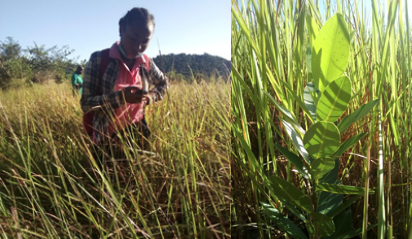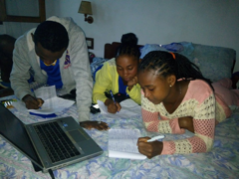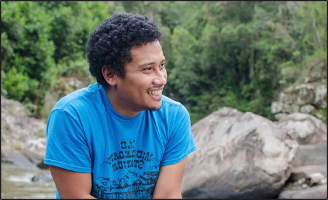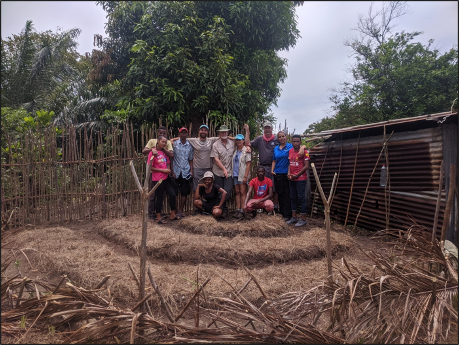DLC-SAVA Conservation forging new collaborations with CURSA, the university of SAVA region: Community building at local tree nursery
By James Herrera, Ph.D. Published August 6, 2020.
The Madagascar government is committed to reforestation. They have an ambitious goal: to plant 60 million trees, in honor of their sixtieth anniversary of independence from France. They want to reforest hundreds of thousands of acres, in an effort to make Madagascar green again. Though this is a difficult plan to execute and oversee, the efforts made thus far exhibit the strong desire by local communities to realize the reforestation goals.
One inspiring experience I had with CURSA was a beautiful Saturday morning spent volunteering at a local tree nursery. This nursery, growing over 60,000 seedlings, is managed by the Regional Directorate of Environment and Sustainable Development (DREDD), and is part of the country-wide effort in the SAVA region. Over 100 CURSA students and teachers volunteered their Saturday to assist in the nursery.
Half the group helped care for the 60,000 seedlings, clearing them of weeds and watering them. The other half filled the DLC-SAVA pickup truck with loads of soil and manure, with which we prepared 3,000 new pots. A local journalist came to interview the tree nursery managers, teachers, and DLC. This outreach opportunity gave excellent coverage of the joint activities among actors in conservation. The media coverage served to build awareness of the efforts for the general public. The DREDD staff made it clear that these trees would be available for all people who want to do reforestation at no cost.
The spirit and enthusiasm of these students made the day go by in the blink of an eye. There was barely a moment of silence while students told jokes and laughed the whole day. The nursery managers were extremely grateful for the help, and the activity sparked new opportunities for collaboration between the local government, CURSA, and DLC.

Since the reforestation campaign in January 2020, CURSA and DLC have been evaluating the progress of six plantations to determine the survival rates of seedlings and identify next steps. Five students have been participating in the evaluation, enumerating the seedlings planted, quantifying the survival rate, and evaluating the conditions at the sites. Thus far approximately 100,000 seedlings were planted in the six plantations, with high survival within the first six months. Many challenges were encountered, however, from overgrowing invasive grasses to rock-hard bone-dry bare soils. Now, in continued collaboration with DREDD, the students and local communities will return to the plantations for much needed maintenance, controlling invasive grasses and amending degraded soils. With this inspiring group, we have great hope to achieve the ambitious goals of covering Madagascar in forest again.

CURSA student Rauchilla (left) searches for planted seedlings partially smothered by invasive grasses (right).
Three CURSA students recently participated in the agroforestry training workshop co-hosted by CURSA and DLC with farming entrepreneurs from SAVA region. These students were motivated by the productive collaboration between the local Parent-Teacher Association, who have created a school tree nursery with DLC. The students decided they wanted to develop independent thesis projects about the agroforestry project. Now they are going out to the remote farmlands of participants to study productive organic methods for cash crops from trees like coffee, cacao, cloves, and fruit trees.

CURSA students Veve (left), Angele (middle), and Rossinie (right) prepare to take data on farming practices used by tree farmers, according to guidelines and standards of the Rainforest Alliance.
Looking forward
I have greatly appreciated my opportunities for collaborations with CURSA, and look forward to more in the near future. As we develop project ideas together, we research funding and resource opportunities to foster our mutual goals. With the support of a broad, international community, CURSA can achieve their goals of educating a multidisciplinary future work force in the SAVA region. Our next plans include three major activities for 2020. First, we plan to co-host a workshop in Research Design and Statistical Analysis for Ecology and Conservation. With Dr. Ramiadantsoa Tanjona of the University of Fianarantsoa, CURSA and DLC-SAVA will engage students in a two-week focused workshop on how to design research projects to test hypotheses relevant to ecological questions and conservation applications.
During one week of lectures and hands-on statistics tutorials, students will learn to analyze and interpret relevant ecological datasets available from the course leaders. During the second week, groups of 2-5 students will work together to analyze data and test their own hypotheses, supervised by workshop leaders. They will create 10-minute scientific PowerPoints of their results, and present them at a showcase open to the university and invited partners. These scientific and professional development skills are important for Malagasy students to develop early, as they prepare for higher education and careers in forestry, sustainable development, and agriculture.
Next, we will conduct the second annual Field Ecology and Conservation workshop. This year, we will learn from our experience in the first workshop to improve with the new class of 2021. Then, we will again engage students in our next agroecology workshops, with a special focus on helping students design agronomy research projects. As CURSA creates an agronomy focus in their curriculum, we look forward to partnering to develop curricula and resources for the courses. We also have an ongoing scholarship program, with two CURSA scholars pursuing master’s degrees at the university in the capital.

Tanjona is a theoretical ecologist who has applied his skills in mathematics to his enthusiasm for the natural world. As an early-career scientist, he has traveled the world to study diverse topics in ecology. He has returned to his home in Madagascar to teach, conduct research, and help conserve endangered ecosystems. His workshop at CURSA will be an enormous opportunity for students, as well as opening doors for collaboration with faculty, and outreach in SAVA region. Photo from University of Wisconsin news webpage.
Thank you
A big thank you to DLC-SAVA Liaison Laura De Ara, who never fails to capture the most amazing moments in her photographs. We are especially thankful to CURSA for partnering with us in these activities, and financially supporting them. We are extremely grateful to our sponsors for supporting these collaborative efforts, especially the Helmsley Charitable Trust, and private donors to the DLC. The DLC’s conservation projects in Madagascar are run exclusively on grants and donor funding. Please consider making a tax-deductible donation today! Your support is what makes these CURSA collaborations possible! Consider a tax-deductible donation to the DLC and specify Madagascar Projects CURSA collaboration to help fund our next workshops. We look forward to more collaborations in the future!
A three-part series
Part I: Conservation Workshop in Marojejy National Park
Part II: Agroecology Workshops
Part III: Community Building at Local Tree Nursery


